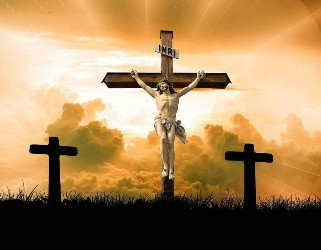
Mardi Gras/Fat Tuesday and the Catholic Church
Tuesday February 17th, 2026
 Mardi Gras is strongly associated with wild bacchanalia and debauchery, but the original intent of the holiday and how it's kept by the faithful is much different. Fat Tuesday, as it is known in English, is a long-standing tradition of the Catholic Church and it marks the last day of ordinary time before the start of Lent, a time of fasting and repentance. While the parties in Europe, South America, and parts of the United States have gained the most attention in popular culture, they seriously misrepresent and outright eclipse the Catholic intent of the holiday.
Mardi Gras is strongly associated with wild bacchanalia and debauchery, but the original intent of the holiday and how it's kept by the faithful is much different. Fat Tuesday, as it is known in English, is a long-standing tradition of the Catholic Church and it marks the last day of ordinary time before the start of Lent, a time of fasting and repentance. While the parties in Europe, South America, and parts of the United States have gained the most attention in popular culture, they seriously misrepresent and outright eclipse the Catholic intent of the holiday.
According to historians, the celebration of Mardi Gras has its roots in the pagan Roman celebration of Lupercalia. This was a February holiday and it honored the Roman god of fertility. It involved feasting, drinking, and carnal behavior.
However, with the rise of the Church in ancient Rome, Christian teaching and morals took root, but there always remained a strong need to blend ancient Roman traditional practices with the growing Christian faith. The blending of tradition with new religious beliefs was a common practice in the ancient world and it helped people to transition away from paganism. In fact, there are a number of ancient Roman traditions that persevere in the Roman Catholic Church to this day, where they continue to guide the faithful.
As Catholic Christianity spread throughout Europe during the first millennium, different cultures celebrated the last day before Lent in their own ways, adapting the practices to suit their cultures. In France, the holiday became particularly popular as people feasted on foods that would be given up during the forty days of Lent. Meats, eggs, and milk were finished off in one day, giving the holiday its French title of 'Mardi Gras' which means Fat Tuesday.
As Europeans crossed the Atlantic to colonize the Americas, they brought their religious practices with them. From the onset, holidays such as Mardi Gras were celebrated in the colonies with as much enthusiasm as they were celebrated in Europe. As the colonies swelled with European immigrants, the celebrations went from the simple to the elaborate. In New Orleans, masked balls and public celebrations quickly became common. In fact, the celebrations became so popular that virtually every citizen of the city joined in even if they were not Catholic.
 However, in the late 18th century, the Spanish took control of New Orleans and having a more militant and serious perspective on the faith, they imposed significant restrictions on the holiday revelry. Among them, they banned masked balls. However, by 1823, this ban was lifted and parades returned by 1837. At this point, the celebration began to lose its identity as an exclusively Catholic tradition and became more secularized over the centuries.
However, in the late 18th century, the Spanish took control of New Orleans and having a more militant and serious perspective on the faith, they imposed significant restrictions on the holiday revelry. Among them, they banned masked balls. However, by 1823, this ban was lifted and parades returned by 1837. At this point, the celebration began to lose its identity as an exclusively Catholic tradition and became more secularized over the centuries.
In Louisiana, Mardi Gras in an official state holiday.
In other parts of the world, the holiday became a season unto itself each branded with unique cultural practices. For example, Venice, Italy is famous for the masked balls that take place on Mardi Gras and the days before. The Venetian tradition dates back to the 13th century and the city remains a popular Mardi Gras destination today.
Still, the original intent of Mardi Gras has always been to indulge, within the context of Catholic morality and reason, the last day before the start of the Lenten season. Here, it is appropriate to mention that while Lent is a season of self-sacrifice and repentance, it is not meant to be a period of self-punishment or extreme hardship.
More Lent & Easter
A Lenten Message from Sister Catherine - Please Watch
Easter 2026 / Lent 2026
Begins on Wednesday February 18th, 2026
Ends on Thursday April 2nd, 2026
'So it is written that the Christ would suffer and on the third day rise from the dead'
Lent Event
Importance
Stations of the Cross
Every Friday
 Stations of the Cross refers to the depiction of the final hours (or Passion) of Jesus, and the devotion commemorating the Passion... continue reading
Stations of the Cross refers to the depiction of the final hours (or Passion) of Jesus, and the devotion commemorating the Passion... continue reading
Living Lent
February 18th, 2026 - April 2nd, 2026
 Commit to your faith and choose to 'live' Lent. Join our 40-day challenge to authentically live the Lenten season. Get inspired, don't just observe Lent, live it!... continue reading
Commit to your faith and choose to 'live' Lent. Join our 40-day challenge to authentically live the Lenten season. Get inspired, don't just observe Lent, live it!... continue reading
Mardi Gras / Fat Tuesday
February 17th, 2026
 In France, the people feasted on foods that would be given up during the forty days of Lent. Meats, eggs, and milk were finished off in one day, giving the holiday its French title of 'Mardi Gras' which means Fat Tuesday... continue reading
In France, the people feasted on foods that would be given up during the forty days of Lent. Meats, eggs, and milk were finished off in one day, giving the holiday its French title of 'Mardi Gras' which means Fat Tuesday... continue reading
Ash Wednesday
February 18th, 2026
 Ash Wednesday marks the beginning of the Season of Lent. It takes place 46 days before Easter Sunday. It is a season of penance, reflection, and fasting... continue reading
Ash Wednesday marks the beginning of the Season of Lent. It takes place 46 days before Easter Sunday. It is a season of penance, reflection, and fasting... continue reading
Palm Sunday
March 29th, 2026
 Palm Sunday, the Sunday before Easter, commemorates Jesus' triumphal entry into Jerusalem, an event mentioned in all four canonical Gospels... continue reading
Palm Sunday, the Sunday before Easter, commemorates Jesus' triumphal entry into Jerusalem, an event mentioned in all four canonical Gospels... continue reading
Holy Week
March 29th, 2026 – April 4th, 2026
 On Palm Sunday, we celebrate the first joy of the season, as we celebrate Our Lord's triumphant entrance into Jerusalem where he was welcomed by... continue reading
On Palm Sunday, we celebrate the first joy of the season, as we celebrate Our Lord's triumphant entrance into Jerusalem where he was welcomed by... continue reading
Holy Thursday / Last Supper
April 2nd, 2026
 Holy Thursday is the most complex and profound of all religious observances. It celebrates his last supper with the disciples, a celebration of Passover... continue reading
Holy Thursday is the most complex and profound of all religious observances. It celebrates his last supper with the disciples, a celebration of Passover... continue reading
Good Friday
April 3rd, 2026
 On Good Friday, each member of the Church tries to understand at what cost Christ has won our redemption. In the solemn ceremonies of Holy Week... continue reading
On Good Friday, each member of the Church tries to understand at what cost Christ has won our redemption. In the solemn ceremonies of Holy Week... continue reading
Easter Sunday
April 5th, 2026
![]() Easter is the principal feast of the ecclesiastical year. Leo I calls it the greatest feast, and says that Christmas is celebrated only in preparation for Easter... continue reading
Easter is the principal feast of the ecclesiastical year. Leo I calls it the greatest feast, and says that Christmas is celebrated only in preparation for Easter... continue reading
FREE Online Lent / Easter Classes Enroll Now
Ascension of Our Lord
Thursday May 14th, 2026
 The Ascension of Our Lord, a Holy Day of Obligation, celebrates the day that Christ, in the presence of His apostles, ascended bodily into Heaven. The Ascension occurred on the 40th day of Easter, a Thursday... continue reading
The Ascension of Our Lord, a Holy Day of Obligation, celebrates the day that Christ, in the presence of His apostles, ascended bodily into Heaven. The Ascension occurred on the 40th day of Easter, a Thursday... continue reading
Pentecost
Sunday May 24th, 2026
 Pentecost Sunday is one of the most ancient feasts of the Church, celebrated early enough to be mentioned in the Acts of the Apostles (20:16) and Corinthians (16:8)... continue reading
Pentecost Sunday is one of the most ancient feasts of the Church, celebrated early enough to be mentioned in the Acts of the Apostles (20:16) and Corinthians (16:8)... continue reading
Fasting and Abstinence
Every Friday
 For most people the easiest practice to consistently fulfill will be the traditional one, to abstain from meat on all Fridays of the year. During Lent abstinence from meat on Fridays is obligatory in the... continue reading
For most people the easiest practice to consistently fulfill will be the traditional one, to abstain from meat on all Fridays of the year. During Lent abstinence from meat on Fridays is obligatory in the... continue reading
What did you give up for Lent?
All of Lent
 From the humorous to the bizarre, people have had interesting Lenten experiences. Tell us about what you are going to give up for this Lenten Year... continue reading
From the humorous to the bizarre, people have had interesting Lenten experiences. Tell us about what you are going to give up for this Lenten Year... continue reading
 Everything answered from when does lent end, ashes, giving something up, stations of the cross and blessed palms. The key to understanding the meaning of Lent is simple... continue reading
Everything answered from when does lent end, ashes, giving something up, stations of the cross and blessed palms. The key to understanding the meaning of Lent is simple... continue reading
![]() The Resurrection of Jesus is the crowning truth of our faith in Christ, a faith believed and lived as the central truth by the first Christian community... continue reading
The Resurrection of Jesus is the crowning truth of our faith in Christ, a faith believed and lived as the central truth by the first Christian community... continue reading
 The Easter Bunny is a symbol of Easter that is popular in western culture, especially with children. According to folklore, the Easter Bunny hides Easter eggs for children to find on Easter morning... continue reading
The Easter Bunny is a symbol of Easter that is popular in western culture, especially with children. According to folklore, the Easter Bunny hides Easter eggs for children to find on Easter morning... continue reading
 He is not here, for he has been raised just as he said. - Matthew 28:6. Learn more about the Post-Resurrection Appearances of Jesus Christ... continue reading
He is not here, for he has been raised just as he said. - Matthew 28:6. Learn more about the Post-Resurrection Appearances of Jesus Christ... continue reading
 Catholic Online Shopping offers a variety of Easter gifts & Easter treats for all ages! Choose a gift for someone special and celebrate the joy of Easter... continue reading
Catholic Online Shopping offers a variety of Easter gifts & Easter treats for all ages! Choose a gift for someone special and celebrate the joy of Easter... continue reading
Easter / Lent News
5 Beautiful scriptures to remind you what Easter is all about Watch

This Easter, make sure to take a moment with your family to thank Jesus for his amazing sacrifice. LOS ANGELES, CA (Catholic Online) - Turn ... continue reading
Good Friday: The Crucifixion of Jesus Christ, the Church and the Sacraments Watch

We will soon commemorate Good Friday. This is the day when the whole world stands still. We will recall the great Sacrifice offered on the ... continue reading
The surprising origins of the Easter Bunny -- it's not what you think! Watch

The Easter Bunny is a symbol of Easter that is popular in western culture, especially with children. According to folklore, the Easter ... continue reading
The Sacred Triduum: Holy Thursday, Good Friday and Easter. The Mystery of Faith Watch

"Beginning with the Easter Triduum as its source of light, the new age of the Resurrection fills the whole liturgical year with its ... continue reading
Footwashing, the Holy Thursday Mandatum: God is Love and Love is a Verb Watch

As we enter into these three days, the one day, we make this mystery our own. No mere spectators in this Act of Love we become ... continue reading
Join the Movement
When you sign up below, you don't just join an email list - you're joining an entire movement for Free world class Catholic education.
A Lenten Message from Sister Catherine - Please Watch
- Easter / Lent
- 5 Lenten Prayers
- Ash Wednesday
- 7 Morning Prayers
- Mysteries of the Rosary
- Litany of the Bl. Virgin Mary
- Popular Saints
- Popular Prayers
- Female Saints
- Saint Feast Days by Month
- Stations of the Cross
- St. Francis of Assisi
- St. Michael the Archangel
- The Apostles' Creed
- Unfailing Prayer to St. Anthony
- Pray the Rosary
![]()
Copyright 2026 Catholic Online. All materials contained on this site, whether written, audible or visual are the exclusive property of Catholic Online and are protected under U.S. and International copyright laws, © Copyright 2026 Catholic Online. Any unauthorized use, without prior written consent of Catholic Online is strictly forbidden and prohibited.
Catholic Online is a Project of Your Catholic Voice Foundation, a Not-for-Profit Corporation. Your Catholic Voice Foundation has been granted a recognition of tax exemption under Section 501(c)(3) of the Internal Revenue Code. Federal Tax Identification Number: 81-0596847. Your gift is tax-deductible as allowed by law.











